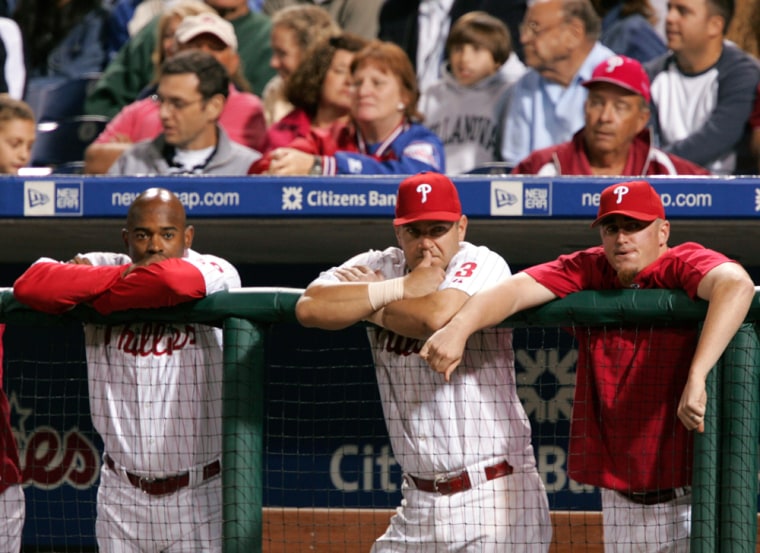To the regret of their suffering fans, the New York Mets, Philadelphia Phillies, San Francisco Giants, and Seattle Mariners had two things in common this season.
First, all four teams were among the most lavish spenders in Major League Baseball, with player payrolls that ranked among the top eight franchises.
Second, not one in the bunch qualified for the post-season playoffs.
With the regular season now a memory, MLB owners once again have proved that the most successful teams on the field aren't necessarily the ones with the biggest bank vaults. Sure, franchises with money to burn have an edge over those forced to live on a tight budget. The New York Yankees and Boston Red Sox, ranked No. 1 and 2, respectively, in the payroll sweepstakes this year, could underscore that point if either makes it to the World Series.
However, among the other teams in the playoffs, the San Diego Padres ranked 16th in salaries, the Chicago White Sox 13th, the Houston Astros were 12th, and the Los Angeles Angels were 4th.
Up from downtrodden
But don't count on money making the difference. To be a winner, franchises also need savvy management, discerning talent evaluators, and when all else fails, a large dose of luck. Examples are easy to find this season, but no easier than in recent seasons, when the last five World Series have been won by five different teams.
In 2005, baseball had the usual rags-to-respectability stories. The formerly downtrodden Milwaukee Brewers finished 81-81 with a $40 million payroll, smaller than all but three teams. The Oakland A's, with a $55 million payroll were pennant contenders until the season's final week despite a payroll that ranked 22nd out of MLB's 30 franchises.
The most stunning example of a cheapo franchise playing like a champ was this year's Cleveland Indians, the Cinderella story of 2005 until a last-minute swoon bumped the surprising Tribe from what appeared to be a safe berth in the playoffs.
Bargains who bloomed
When the season began no one foresaw a pennant chase in this young and unproven team's future. The skeptics included Mark Shapiro, the team's clever general manager, who before the season went public with a prediction that the team was a year away from contending. Looking at payroll alone, 2090 would have been a saner prediction. The Indians ranked 26th, with salaries totaling $41.5 million. The only teams with lower payrolls this season were Milwaukee, Pittsburgh, Kansas City, and Tampa Bay, perennial doormats. For every dollar the Indians spent on players, the Yankees peeled off almost five.
But in baseball, money can't always buy a clutch single. In 2002, Shapiro traded away several higher-price players, receiving raw minor leaguers in whom he saw future stardom. This year, rookie outfielder Grady Sizemore (salary, $318,300) and fourth-year catcher Victor Martinez ($500,000), among others, bloomed. And the Indians were bargain-basement contenders whose hopes of qualifying for the playoffs were alive until the regular season's final day.
Surprises also are possible at the top end of the payroll scale. The mighty Yankees haven't won a World Series since 2000, despite a gaudy payroll that keeps getting gaudier. (The Yanks' $208 million in salaries in 2005 is almost $84 million more than the second-place Red Sox).
The $100 million club
The Yankees habitually pay large salaries to veteran players with proven star potential. Sometimes the investment pays off, as with Alex Rodriguez, whose $26 million salary is MLB's highest and whose performance this season (a .321 batting average and league-leading 48 home runs) thoroughly justified it. Or the mistakes can be breathtakingly expensive. Yankees pitchers Kevin Brown and Carl Pavano, whose earnings totaled $24 million, combined to win only eight games.
At least Yankee owner George Steinbrenner's largesse has been repaid with a team that regularly wins its way to post-season play. Not every free-spending team accomplishes that much. This season, the Mets were the only franchise other than the Yankees and Red Sox to crash the $100 million mark in payroll. The New Yorkers signed two prized free agents in pitcher Pedro Martinez ($10.8 million) and outfielder Carlos Beltran ($11.5 million) and still finished fourth in a five-team division.
The Giants had an excuse, of sorts. Of the team's $90 million payroll -- seventh-highest this year -- $22 million went to slugger Barry Bonds, who spent virtually the entire season nursing a sore knee. The Giants didn't even win half their games. It was an even drearier season for the Seattle Mariners, who outspent all but seven teams yet posted the fifth-worst record overall.
Record attendence
Such disparities can ruin a spring and summer of one team's diehard fans. But they bring big smiles to baseball Commissioner Bud Selig. Selig is in the "hope" business. A successful season for the commish is one in which ballparks in a dozen or more cities are filled into late September with fans convinced their heroes are headed to the World Series. With two weeks left this season, 13 teams were still digging for the playoffs.
On Oct. 3, MLB said a record 74.9 million fans attended baseball games in the 2005 regular season, up 2.6 percent over the previous record of 73 million in 2004. That's as close to a perfect summer as Selig may ever see.
